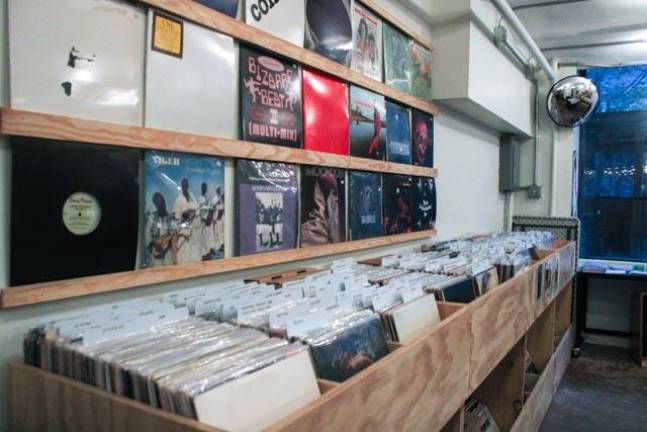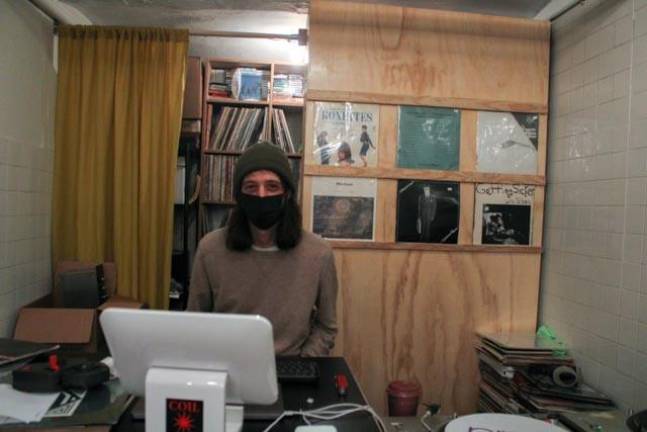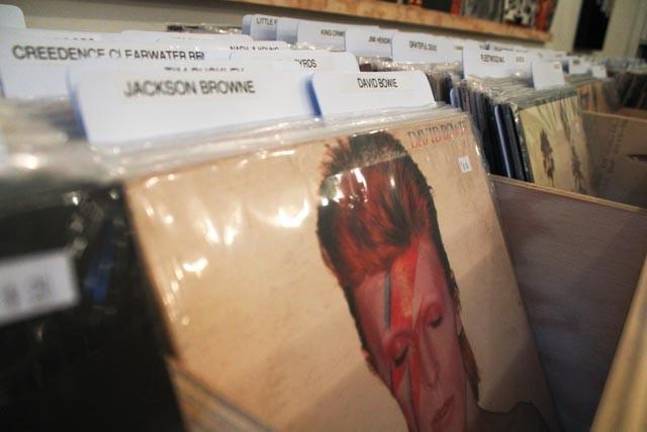New Record Store Plays on Growing Love for Vinyl
Ergot Records owner Adrien Rew says his new business has been surprisingly good



“Don’t use the word ‘vinyls’ plural.” Adrian Rew instructs. The Ergot Records owner donned a beanie and Birkenstocks with socks inside his store. “Vinyl is the material that records are made of. So, plural of record is records, plural of vinyl is vinyl.” Rew opened Ergot in September and business has been surprisingly good.
He decided to open his store during the pandemic when rents were down. Rew used to work at A1 records, next to Tompkins Square Park, before leaving to work for a nonprofit. But he missed his time in a record store, which helped inspire him to start his own.
The shop, which is located at 2nd Street and Second Ave., took around three months to renovate and set up. Most of the renovations were done by Rew’s girlfriend Valerie Keane, a New York based sculptor. “She has all of the handy woman skills that I entirely lack,” says Rew. Keane built all the furniture in the store.
Ergot came as an offshoot of Rew’s record label of the same name which he founded 10 years ago. The label still exists and produces something akin to lo-fi fusion music with hints of global inspiration, and Rew says there’s something forthcoming in the next year.
The name Ergot comes from a type of fungus that grows on rye bread. The fungus is speculated to cause hallucinations and is rumored to be involved with major historical events like the Salem Witch Trials or the Dancing Plague of 1518. Rew likes that it represents a “renewal of older things, like used records.” He also joked that ergot’s association with the dancing plague make it the perfect name for a store opening during COVID.
Business has been doing so well that it’s actually a problem. Though Rew spent the early days of the pandemic buying up record collections for his soon-to-be store, it wasn’t enough. “Used records are a nonrenewable resource so I can’t just order more,” says Rew. To refill his inventory, he sources collections and makes deals around the tri-state area. “I’m happy to make house calls.” Rew tries to include a variety of genres from rock, to electronic, to minimalism, so that his store has a little something for everyone. Although he plans on expanding his collection of new albums, he loves the “moldy oldies” and is always happy to buy in store.
Record sales have been on the rise in the past few years, especially among younger millennials and Gen Z. According to midyear data from MRC, vinyl sales have had a 108.2% lift this year, and 2020 marked the 15th year in a row of increased growth. Last year was the first year since 1991 in which vinyl outsold CDs.
Rew is unsure why young people are into records. “It’s so hard for me to enter the younger generation’s mindset because they grew up without considering music as a physical object,” he says. He estimates that the age demographic in his store is people ages 20-50 with a smattering of NYU kids thrown in. “Once you get past 50 your more in the get rid of this stuff phase,” he says.
“Wonderful Tightrope Act”
Paul Cavalconte is a radio host for New York Public Radio and has been in love with vinyl his whole life. He is one of the few hosts who still plays records live on air. On Sundays he hosts a show called “Vinyl Experience” where he dubs records on his hi-fi system so he can play his records on air.
Cavalconte grew up adopting his parents’ old 78 rpm records. When he started working for radio stations, they still used vinyl. “There was a wonderful tightrope act,” says Cavalconte. “You queued up a disk and hit start, and it’s spinning, and it could skip, and maybe the solution to that was to pull a quarter out of your pocket and gently place it down on top of the tonearm.” He still misses the sound of turntables queuing up the next record. “It’s very different when you’re sitting in front of the computer screen and watching numbers rolling in front of you.”
But Cavalconte isn’t averse to the digital age. “As a radio DJ I was completely blown away by CDs,” he said. Having a singular disk with any variety of songs that automatically did most of the work was a game changer. Cavalconte no longer needed to guesstimate when a song would finish playing because now there was a countdown, and CDs proved to be far lighter than records. But he also complains that the sounds quality is “bright and brittle” without the depth of vinyl records which have “the flow of live music.”
Calvalconte believes that the appeal of records for young people stems from hearing older generations talk about the better sound quality. He also thinks it might come from a desire to connect with a more analog world now that all information is at our fingertips. Though records are manufactured, Cavalconte loves the analog nature of them. “It’s about owning a piece of the past and having an object of the past which becomes an object of beauty, which becomes an object of art,” he says.
Rew wants his store to sell the cream of the crop. “From the postmodern perspective, the notion of authenticity is so often dismissed,” he says describing what he’s looking for. He describes authenticity as “when that music is being screamed from these people’s souls.”
He also wants to build a community of music lovers, which he does by hosting events like live DJs or release parties. “That’s really what having a record store, as opposed to an online business, is about for me,” says Rew. “It’s providing that space for different types of fans of music to coexist in the space and inevitably begin to converse and learn from each other.”